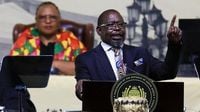South Africa's political landscape is facing significant upheaval as the African National Congress (ANC) has passed its budget without the support of its coalition partners, raising serious concerns about the stability of the current Government of National Unity. This development comes on the heels of a tumultuous period marked by failed negotiations and escalating tensions among the coalition members.
On April 2, 2025, South Africa's parliament approved the budget's fiscal framework and revenue proposals, a move that has sparked outrage among coalition partners who feel sidelined. The ANC, which has been the ruling party since the end of apartheid, is now at a crossroads, as its decision to proceed without consensus threatens to unravel the fragile alliances that have kept the government afloat.
The backdrop to this crisis dates back to February 24, when Finance Minister Enoch Godongwana presented a budget proposal that included a controversial 2% increase in the Value Added Tax (VAT). This proposal was met with fierce resistance and ultimately rejected, prompting President Cyril Ramaphosa and other leaders to recognize the urgent need for the coalition to demonstrate its ability to work together. "It gave the Government of National Unity a second chance to show that the coalition could reach an agreement," Ramaphosa remarked at the time, emphasizing the importance of unity in facing the country's economic challenges.
However, the ANC's unilateral decision to pass the budget has raised alarms. Many observers believe this could signal the beginning of the end for the coalition, which has struggled to maintain cohesion amidst diverging priorities and political ambitions. The coalition, formed in the wake of the 2019 elections, was intended to bring together various parties to create a stable government capable of addressing South Africa's pressing issues, including high unemployment and economic stagnation.
Political analysts are now questioning whether the ANC's recent actions will lead to a complete breakdown of the coalition. With the budget passed, the ANC may find itself increasingly isolated, as former allies reconsider their positions. Coalition partners have expressed frustration over the lack of consultation and transparency in the decision-making process, which they argue undermines the very foundation of the coalition.
As the dust settles from the budget passage, the ANC's leadership faces mounting pressure to engage with its partners and address their grievances. The potential fallout from this decision could have far-reaching implications, not only for the coalition but also for the ANC's political future. If the coalition collapses, South Africa could be thrust into a political crisis, with early elections becoming a distinct possibility.
Meanwhile, the economic implications of the budget are also under scrutiny. South Africa's economy has been grappling with slow growth, high inflation, and rising public debt, making the need for a coherent fiscal strategy more critical than ever. The rejection of the VAT increase proposal highlighted the delicate balance the government must strike between generating revenue and maintaining public support.
In the wake of the budget's passage, various political factions have begun to voice their opinions. Some coalition partners have called for a renegotiation of terms, arguing that the ANC's approach is detrimental to the collaborative spirit that the Government of National Unity was meant to embody. Others have suggested that the ANC's actions could lead to a reevaluation of their support, with some members contemplating a shift to opposition.
The public response has also been mixed. Many South Africans are disillusioned with the current government, feeling that the coalition has failed to deliver on its promises. The lack of consensus on key issues has left citizens wondering whether their leaders are truly committed to addressing the country's challenges.
As the situation continues to evolve, all eyes will be on President Ramaphosa and the ANC's leadership. Their next steps will be critical in determining the future of the coalition and the stability of South Africa's government. The coming weeks are likely to be pivotal as negotiations ensue and the political landscape shifts in response to the budget's passage.
In conclusion, South Africa stands at a significant crossroads. The ANC's decision to pass the budget without partner support could have lasting implications for the coalition and the broader political landscape. As tensions rise and calls for unity grow louder, the government's ability to navigate this crisis will be crucial in shaping the future of the nation.






